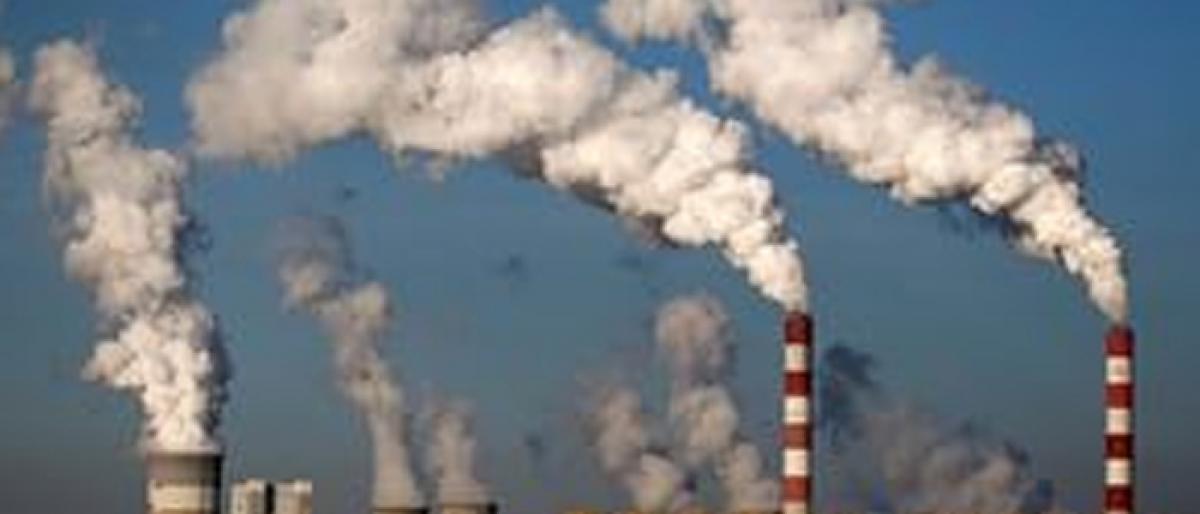Live
- 2 senior professors to join NALSAR
- Former Principal of SPW College passes away in US
- Hyderabad: Govt out to remove electric poles, transformers on roads across city
- KCR goes into huddle with State legal eagles
- Formula E race: KTR to be arrested soon?
- Film fraternity stands with Allu Arjun
- New CUAP campus faces security challenges
- HC grants protection to Allu Arjun from arrest
- Stampede victim’s husband ready to withdraw case against Allu Arjun
- Tomatoes price falls drastically to Rs 1 per kg at Pathikonda agri market
Just In

The proposed National Clean Air Programme (NCAP) would be of \"no use\" as it has \"not mentioned sector-specific and time-bound emission reduction targets\" for industries. It has also failed to lay enough emphasis on units which are contributing to air pollution, environmentalists say.
The proposed National Clean Air Programme (NCAP) would be of "no use" as it has "not mentioned sector-specific and time-bound emission reduction targets" for industries. It has also failed to lay enough emphasis on units which are contributing to air pollution, environmentalists say.
With the goal to meet the prescribed annual average ambient air quality standards at all locations in the country in a stipulated timeframe, the Union Ministry of Environment, Forest and Climate Change, in mid-April, floated the draft of the programme seeking public opinion till May 17.
According to experts, the draft suggests that NCAP will reduce air pollution by 35 per cent within next three years and 50 per cent in the next 5 years. "This is more of a generic target for the country and it has to be translated into city or region wise target," the environment think-tank Centre for Science and Environment (CSE) Executive Director Anumita Roychowdhury told IANS.
"On the basis of this pan India target, sector-specific targets which are not mentioned in the proposed programme have to be worked out for industries and accordingly a roadmap of stringent action is required to be followed to meet ambient air quality standards in a time bound manner," she added. The draft acknowledged air pollution "has increasingly been becoming a serious concern predominantly for the health of the people".
While the problem of air pollution is mainly urban-centric, studies show regional scale pollution, which is more concentrated in entire Indo- Gangetic plains of India and more industrialised states, the draft said. "The draft NCAP does not clearly speak about what should be done with various industrial sectors that are contributing to air pollution, though it recognised the fact that they are among major sources of air pollution. The proposed programme, without sector-specific and time-bound emission reduction targets, would be of no use," Greenpeace India Senior Campaigner, (Climate & Energy) Sunil Dahiya said.
Echoing Dahiya, Legal Initiative for Forest and Environment's Analyst Kankana Das told IANS: "Industries ranging from thermal power, cement, foundry, coke oven and sponge iron plants to construction sector and transports which are major contributors to air pollution hardly got any place in the discussion of the proposed porgramme."
The government, however, has undertaken a slew of measures, including notification of National Ambient Air Quality Standards and sector specific emission and effluent standards for industries, monitoring network for assessment of ambient air quality, introduction of cleaner fuel, leapfrogging from BS IV to BS VI standards for vehicles by April 1, 2020, ban on bursting of sound-emitting crackers between 10 p.m. and 6 a.m. and many others.
"With these recent policy interventions, air quality has purportedly shown some minor improvement in some major cities in recent times which as of now cannot be called a trend," the draft said. However, this is "not sufficient" and higher level of focused time bound initiatives at both city and rural level now "appear obligatory" to address the issue comprehensively at the national level, it further said.
The draft proposes source apportionment study and formulation of action plan, but experts argue there is lack of synchronisation between the two. "According to the proposed draft, the source apportionment study will be done in two years for 94 non-attainment cities, whereas the action plan for 100 non-attainment cities will be formulated in one year. Without having an insight of pollution sources, what is the purpose of making city specific action plan?
It defeats the whole purpose of coming out with an action plan," Das said.
For instance, West Bengal has Kolkata as the only non-attainment city. What about cities like Asansol, Raniganj, Howrah or Durgapur which are already listed as Critically Polluted Areas (CPAs) or Severely Polluted Areas (SPAs) in terms of air pollution component," she asked. Roychowdhury pointed out National Ambient Air Quality standards by themselves "do not put the liability of achieving them on the state governments or pollution control boards".
"The NCAP framework needs a system that will incentivise achievement of air quality targets and disincentivise failure to meet the targets. The system needs teeth," she said. The environmentalists alleged data from Continuous Emission Monitoring System (CEMS) and ambient air quality monitoring stations installed in the vicinity of the industrial plants and facilities, specifically for 17 red-category industries, was not made public. "NCAP must address this issue," Dahiya said.
By: Bappaditya Chatterjee

© 2024 Hyderabad Media House Limited/The Hans India. All rights reserved. Powered by hocalwire.com







